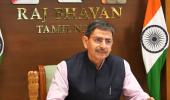Unless Governor Ravi or the Union of India moves in appeal, seeking a hearing by a constitutional Bench, this is where it all will have to end, observes N Sathiya Moorthy.

The tough-talking Supreme Court verdict, telling governors (in Opposition-ruled states) to 'behave' and unprecedentedly invoking its powers under Article 142 to clear 10 Tamil Nadu Bills at one go, may have left Governor R N Ravi with little option but to bow out with grace -- or, disgrace.
The alternative would be for President Droupadi Murmu to withdraw her 'pleasure' for Ravi's continuance or the political leadership to advise him to put in his resignation.
The customary transfer of an embarrassing governor to another Raj Bhavan may not be available to the incumbent at Chennai's Guindy.
Without naming them or mentioning their culpability, the division bench of Justices J B Pardiwala and Justice R Mahadevan has also put the Union of India, starting with the President, prime minister and the home minister on notice.
Their unmentioned culpability should owe to their allowing a governor to run amuck the way Ravi had done while holding back his assent or belatedly forwarding Bills legitimately passed by the state legislature to the Centre, if only to cock a snook at the due processes that Ravi was consistently violating with gay abandon.
Unless Ravi or the Union of India moves in appeal, seeking a hearing by a Constitutional Bench, this is where it all will have to end.
With Tuesday's verdict, the state assembly's amendments to the University Acts, making the chief minister their chancellor in place of the governor, as used to be the custom from the British days, would take effect.
It is another matter that in Prime Minister Narendra Modi's native Gujarat, for instance, the chief minister has been the chancellor of the state's universities.
The governor in Tamil Nadu would have remained the chancellor of all state government universities, if and if only, Ravi, and his predecessor, Banwarilal Purohit, not begun interfering with the affairs of those varsities, starting with the appointment of the vice-chancellors. It did not stop there.
They would hold frequent conferences with the academic and administrative staff of different universities and keep visiting them as no other predecessor had done for over 50 years and more.

In the immediate aftermath of the Supreme Court verdict, the ruling Dravida Munnetra Kazhagam and Chief Minister M K Stalin may give a reasonable time for Ravi and/or the Centre to act, especially if there are clear signs of their acting on the hints clearly dropped by the higher judiciary.
It is not unlikely that the state assembly, now in session, may then pass a resolution in the matter.
The chances are that the Opposition All India Anna DMK too may consider backing such a resolution, especially since gubernatorial overaction of governor as chancellor had begun when party leader Edappadi K Palaniswami was the chief minister and Purohit, governor.
If it came to that, it could well be the third time in a row in a matter of days when the Opposition AIADMK had voted with the ruling rival, after those on delimitation and Kachchatheevu retrieval.
In the latter one, especially, the BJP legislature party, possibly reading the mood of the state, staged a walkout without staying back and voting against the resolution.
So much so, it is not the DMK allies whose conduct in the assembly would be watched but that of the AIADMK and the BJP.
Needless to underline, the Supreme Court verdict has come at a right time for the morale of the DMK, which was anyway high in recent months but was becoming tentative in the light of perceived alliance talks between the other two for next summer's assembly polls.
Now the anti-BJP faction, purportedly led by none other than EPS himself, has one more stick to beat the party with -- rather those within the AIADMK who want to revive the poll alliance that they had snapped ahead of last year's Lok Sabha polls.

In a state where the common people still have a lot of respect for the higher judiciary and whose daily dose of politics and Constitutional matters come from multiple YouTube channels with their own set of 'experts', any inadequate or improper reaction of the governor or his Constitutional/political masters in Delhi could reflect badly on the BJP's image and that of PM Modi, whom critics in the state claim is a 'habitual violator of political and Constitutional norms' -- even if the truth is otherwise.
An added problem for the BJP is the possibility of the DMK getting an edge in matters of IT/ED/CBI raids on its ministers, dubbing them all as 'politically vindictive', and nothing more.
However, not many would be willing to stomach the second half of their claims here, but would be convinced that the former was the case, after all.
This too can have consequences for the BJP in a state where the party's nationally successful Hindutva agenda and actions have only revived a 'rival' pan-Tamil cause that was either lying dormant for decades and was even possibly on the way out.
N Sathiya Moorthy, veteran journalist and author, is a Chennai-based policy analyst and political commentator.
Feature Presentation: Rajesh Alva/Rediff.com










